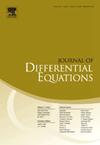Two-dimensional signal-dependent parabolic-elliptic Keller-Segel system and its mean-field derivation
IF 2.3
2区 数学
Q1 MATHEMATICS
引用次数: 0
Abstract
In this paper, the well-posedness of two-dimensional signal-dependent Keller-Segel system and its mean-field derivation from a interacting particle system on the whole space are investigated. The signal dependence effect is reflected by the fact that the diffusion coefficient in the particle system depends nonlinearly on the interactions between the individuals. Therefore, the mathematical challenge in studying the well-posedness of this system lies in the possible degeneracy and the aggregation effect when the concentration of signal becomes unbounded. The well-established method on bounded domains, to obtain the appropriate estimates for the signal concentration, is invalid for the whole space case. Motivated by the entropy minimization method and Onofri's inequality, which has been successfully applied for the parabolic-parabolic Keller-Segel system, we establish a complete entropy estimate benefited from the linear diffusion term, which plays an important role in obtaining the estimates for the solution. Furthermore, the upper bound for the concentration of signal is obtained. Based on the estimates we obtained for the density of bacteria, the rigorous mean-field derivation is proved by introducing an intermediate particle system with a mollified interaction potential with logarithmic scaling. By using this mollification, we obtain the convergence of the particle trajectories in expectation, which implies the weak propagation of chaos. Additionally, under a regularity assumption of the initial data, we infer higher regularity for the solutions, which allows us to use the relative entropy method to derive the strong convergence for the propagation of chaos.
二维信号相关抛物-椭圆Keller-Segel系统及其平均场推导
本文研究了二维信号相关的Keller-Segel系统在全空间上的适定性及其相互作用粒子系统的平均场推导。粒子系统中的扩散系数非线性地依赖于个体之间的相互作用,这反映了信号依赖效应。因此,研究该系统的适定性的数学挑战在于当信号的浓度变得无界时可能出现的退化和聚集效应。在有界域上得到适当的信号浓度估计的方法,对于整个空间情况是无效的。利用已成功应用于抛物-抛物型Keller-Segel系统的熵最小化方法和Onofri不等式,建立了利用线性扩散项的完全熵估计,该估计对解的Lp估计有重要作用。进一步给出了信号浓度的上界。基于我们对细菌密度的估计,通过引入一个具有对数标度的缓和相互作用势的中间粒子系统,证明了严格的平均场推导。通过这种平滑,我们得到了粒子轨迹在期望中的收敛性,这意味着混沌的弱传播。此外,在初始数据的正则性假设下,我们推断出解具有较高的正则性,这使得我们可以使用相对熵方法推导出混沌传播的强L1收敛性。
本文章由计算机程序翻译,如有差异,请以英文原文为准。
求助全文
约1分钟内获得全文
求助全文
来源期刊
CiteScore
4.40
自引率
8.30%
发文量
543
审稿时长
9 months
期刊介绍:
The Journal of Differential Equations is concerned with the theory and the application of differential equations. The articles published are addressed not only to mathematicians but also to those engineers, physicists, and other scientists for whom differential equations are valuable research tools.
Research Areas Include:
• Mathematical control theory
• Ordinary differential equations
• Partial differential equations
• Stochastic differential equations
• Topological dynamics
• Related topics

 求助内容:
求助内容: 应助结果提醒方式:
应助结果提醒方式:


